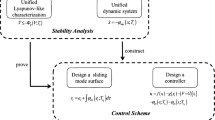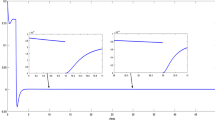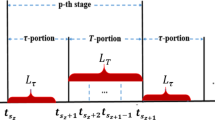Abstract
This study is concerned with the problem of finite-time fault-tolerant control for uncertain semi-Markovian jump systems with input constraint and multiple time delays. There exist nonlinear functions, exogenous disturbances and measurement noise in these nonlinear systems. First, a dynamic output feedback controller is constructed for the uncertain semi-Markovian jump systems. A closed-loop system is earned. Next, sufficient stability conditions of the closed-loop system are obtained via stochastic Lyapunov function. Not only finite-time boundedness but also input-output finite-time mean square stabilization is achieved. This study is the first time to study. Finally, an example is provided to prove the novelty of the approach proposed in this paper.








Similar content being viewed by others
References
Lin WJ, He Y, Zhang CK, Wu M, Shen J (2019) Extended dissipativity analysis for Markovian jump neural networks with time-varying delay via delay-product-type functionals. IEEE Trans Neural Netw Learn Syst 30(8):2528–2537
Zhang Q, Zhang J, Wang Y (2017) Sliding-mode control for singular Markovian jump systems with Brownian motion based on stochastic sliding mode surface. IEEE Trans Syst Man Cybern Syst 49(3):494–505
Shen H, Men Y, Wu ZG, Park JH (2017) Nonfragile \({\cal{H}}_{\infty }\) control for fuzzy Markovian jump systems under fast sampling singular perturbation. IEEE Trans Syst Man Cybern Syst 48(12):2058–2069
Gao L, Cao Z, Wang G (2019) Almost sure stability of discrete-time nonlinear Markovian jump delayed systems with impulsive signals. Nonlinear Anal Hybrid Syst 34:248–263
Li F, Du C, Yang C, Gui W (2017) Passivity-based asynchronous sliding mode control for delayed singular Markovian jump systems. IEEE Trans Autom Control 63(8):2715–2721
Xia Y, Fu M, Shi P, Wu Z, Zhang J (2009) Adaptive backstepping controller design for stochastic jump systems. IEEE Trans Autom Control 54(12):2853–2859
Wu Z, Dong S, Shi P, Su H, Huang T (2019) Reliable filtering of nonlinear Markovian jump systems: The continuous-time case. IEEE Trans Syst Man Cybern Syst 49(2):386–394
Xu S, Lam J, Mao X (2007) Delay-dependent \(H_{\infty }\) control and filtering for uncertain Markovian jump systems with time-varying delays. IEEE Trans Circuits Syst I Regul Pap 54(9):2070–2077
Nguyen KH, Kim SH (2020) Observer-based control design of semi-Markovian jump systems with uncertain probability intensities and mode-transition-dependent sojourn-time distribution. Appl Math Comput 372:124968
Li F, Shi P, Wu L, Basin M, Lim C (2015) Quantized control design for cognitive radio networks modeled as nonlinear semi-Markovian jump systems. IEEE Trans Ind Electron 62(4):2330–2340
Jiang B, Karimi HR, Kao Y, Gao C (2018) A novel robust fuzzy integral sliding mode control for nonlinear semi-Markovian jump T–S fuzzy systems. IEEE Trans Fuzzy Syst 26(6):3594–3604
Jiang B, Karimi HR, Kao Y, Gao C (2020) Adaptive control of nonlinear semi-Markovian jump T–S fuzzy systems with immeasurable premise variables via sliding mode observer. IEEE Trans Cybern 50(2):810–820
Shen Q, Yue C, Goh CH, Wang D (2019) Active fault-tolerant control system design for spacecraft attitude maneuvers with actuator saturation and faults. IEEE Trans Ind Electron 66(5):3763–3772
Bahreini M, Zarei J (2020) Robust finite-time fault-tolerant control for networked control systems with random delays: a Markovian jump system approach. Nonlinear Anal Hybrid Syst 36:100873
Wang X, Wang Z, Xu Z, Cheng M, Wang W, Hu Y (2019) Comprehensive diagnosis and tolerance strategies for electrical faults and sensor faults in dual three-phase PMSM drives. IEEE Trans Power Electron 34(7):6669–6684
Papaspiliotopoulos VA, Korres GN (2018) A peculiar property of double-phase-to-ground faults in the presence of fault resistance. IEEE Trans Power Deliv 33(4):2044–2046
Xu SS, Chen C, Wu Z (2015) Study of nonsingular fast terminal sliding-mode fault-tolerant control. IEEE Trans Ind Electron 62(6):3906–3913
Li N, Sun H, Zhang Q (2019) Robust passive adaptive fault tolerant control for stochastic wing flutter via delay control. Eur J Control 48:74–82
Ma L, Huang Y, Zhou L, Wang J, Shi D (2019) Fault tolerant control for a class of nonlinear system with actuator faults, fault tolerant control for a class of nonlinear system with actuator faults. Asian J Control. https://doi.org/10.1002/asjc.2225
Li J, Gao H, Zhang P, Huang D (2012) Fault diagnosis and optimal fault-tolerant control for systems with delayed measurements and states. Int J Control Autom Syst 10(1):150–157
Amato F, Carannante G, De Tommasi G, Pironti A (2012) Input–output finite-time stability of linear systems: necessary and sufficient conditions. IEEE Trans Autom Control 57(12):3051–3063
Sau NH, Phat VN, Niamsup P (2018) On finite-time stability of linear positive differential-algebraic delay equations. IEEE Trans Circuits Syst II Express Briefs 65(12):1984–1987
Xue X, Xu H, Xu L (2019) Distributed finite-time control for Markovian jump systems interconnected over undirected graphs with time-varying delay. IET Control Theory Appl 13(18):2969–2982
Yan Z, Zhang W, Zhang G (2015) Finite-time stability and stabilization of Itô stochastic systems with Markovian switching: mode-dependent parameter approach. IEEE Trans Autom Control 60(9):2428–2433
Amato F, Ambrosino R, Ariola M, Cosentino C (2009) Finite-time stability of linear time-varying systems with jumps. Automatica 45(5):1354–1358
Qi W, Zong G, Karimi HR (2020) Finite-time observer-based sliding mode control for quantized semi-Markov switching systems with application. IEEE Trans Ind Inf 16(2):1259–1271
Ren H, Zong G, Li T (2018) Event-triggered finite-time control for networked switched linear systems with asynchronous switching. IEEE Trans Syst Man Cybern Syst 48(11):1874–1884
Yan H, Tian Y, Li H, Zhang H, Li Z (2019) Input–output finite-time mean square stabilization of nonlinear semi-Markovian jump systems. Automatica 104:82–89
Wei Y, Qiu J, Fu S (2015) Mode-dependent nonrational output feedback control for continuous-time semi-Markovian jump systems with time-varying delay. Nonlinear Anal Hybrid Syst 16:52–71
Jiang B, Karimi HR, Kao Y, Gao C (2018) Takagi–Sugeno model-based sliding mode observer design for finite-time synthesis of semi-Markovian jump systems. IEEE Trans Syst Man Cybern Syst 49(7):1505–1515
Han J, Zhang H, Wang Y, Liu X (2016) Robust fault estimation and accommodation for a class of T–S fuzzy systems with local nonlinear models. Circuits Syst Signal Process 35:3506–3530
Zhang Cishen, Evans RJ (1994) Continuous direct adaptive control with saturation input constraint. IEEE Trans Autom Control 39(8):1718–1722
Lin X, Du H, Li S, Zou Y (2013) Finite-time stability and finite-time weighted \(l_2\)-gain analysis for switched systems with time-varying delay. IET Control Theory Appl 7(7):1058–1069
Xiang Z, Sun YN, Mahmoud MS (2012) Robust finite-time \(H_\infty \) control for a class of uncertain switched neutral systems. Commun Nonlinear Sci Numer Simul 17(4):1766–1778
Chen F, Garnier H, Padilla A, Gilson M (2020) Recursive IV identification of continuous-time models with time delay from sampled data. IEEE Trans Control Syst Technol 28(3):1074–1082
Abdollahi F, Khorasani K (2011) A decentralized Markovian jump \({{\cal{H}}}_{\infty }\) control routing strategy for mobile multi-agent networked systems. IEEE Trans Control Syst Technol 19(2):269–283
Du D, Jiang B, Shi P (2014) Sensor fault estimation and accommodation for discrete-time switched linear systems. IET Control Theory Appl 8(11):960–967
Zhang H, Wang Y, Liu D (2008) Delay-dependent guaranteed cost control for uncertain stochastic fuzzy systems with multiple time delays. IEEE Trans Cybern 38(1):126–140
Huang S, He X, Zhang N (2011) New results on \(H_\infty \) filter design for nonlinear systems with time delay via T–S fuzzy models. IEEE Trans Fuzzy Syst 19(1):193–199
Sun N, Wu Y, Fang Y, Chen H (2018) Nonlinear antiswing control for crane systems with double-pendulum swing effects and uncertain parameters: design and experiments. IEEE Trans Autom Sci Eng 15(3):1413–1422
Yang T, Sun N, Chen H, Fang Y (2020) Observer-based nonlinear control for tower cranes suffering from uncertain friction and actuator constraints with experimental verification. IEEE Trans Ind Electron. https://doi.org/10.1109/TIE.2020.2992972
Wu Y, Sun N, Chen H, Fang Y (2020) Adaptive output feedback control for 5-DOF varying-cable-length tower cranes with cargo mass estimation. IEEE Trans Ind Inf. https://doi.org/10.1109/TII.2020.3006179
Acknowledgements
This work was supported by the National Natural Science Foundation of China (U1908217), the Liaoning Revitalization Talents Program (XLYC1902055) and the Fundamental Research Funds for the Central Universities (N180415004).
Author information
Authors and Affiliations
Corresponding author
Ethics declarations
Conflict of interest
The authors declare that they have no conflicts of interest to this work. We declare that we have no financial and personal relationships with other people or organizations that can inappropriately influence our work. There is no any commercial or associative interest that represents a conflict of interest in connection with the paper submitted.
Additional information
Publisher's Note
Springer Nature remains neutral with regard to jurisdictional claims in published maps and institutional affiliations.
Rights and permissions
About this article
Cite this article
Pang, Y., Wang, X., Li, T. et al. Multiple delay-dependent finite-time boundedness and input–output finite-time mean square stabilization of uncertain semi-Markovian jump systems with input constraint. Neural Comput & Applic 33, 6611–6626 (2021). https://doi.org/10.1007/s00521-020-05423-3
Received:
Accepted:
Published:
Issue Date:
DOI: https://doi.org/10.1007/s00521-020-05423-3




